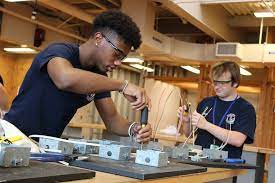Technical schools provide training in a wide range of professions and may be the best option for students who wish to work in a field that values practical experience as much as demands it. In this article, we define technical schools, compare them to vocational schools, discuss reasons to seek a technical education, and provide a list of jobs that call for this training.
What is a Technical School
Technical school offer students specialized training that educates them for a particular career or trade. They are also known as technical colleges or technical institutes. Several subjects of study are available at technical schools, including:
- Culinary arts
- Cosmetology
- Computer technology
- Fashion
- Automotive technology etc.
In less than two years to as long as four years, technical colleges offer programs that result in the awarding of a certificate, diploma, or associate degree. An Associate of Arts, Associate of Science, and Associate of Applied Science are all associate degrees that can be earned at a technical institution.
What is a Technical High School
Additionally, technical schools are an alternative for high school pupils. In addition to receiving a high school education in math, science, reading, social studies, and information technology, technical high school students receive training in certain vocational disciplines. Technical high schools provide education in a variety of fields, just like technical colleges. Typically, freshmen complete a survey to determine their professional path, and sophomores start studying for their vocational track.
Jobs Requiring Technical Training
A range of fields are trained in technical colleges. Just a few jobs that necessitate technical training are listed below:
#1. HVAC Specialist
- National average hourly wage: $23.39
HVAC technicians’ key responsibilities include setting up, repairing, and maintaining HVAC, refrigeration, and air-conditioning systems. Some professionals decide to focus on a particular system (like heating and air conditioning) or type of service (like installation). The key responsibilities of an HVAC specialist include replacing worn-out filters, carrying out regular maintenance, and upgrading equipment.
#2. Practical Nurse License
- The national average pay for a licensed practical nurse is $23.58 per hour
Primary responsibilities: Licensed practical nurses are overseen by physicians and registered nurses. The main responsibilities of an LPN include monitoring patients’ vital signs, giving them medication, giving them a bath, and dressing them. Hospitals, nursing homes, clinics, and private residences are just a few of the settings where LPNs might find employment.
#3. Plumber
- The national average wage for a plumber is $25.36 per hour
Plumbers are educated to install and repair water and gas supply lines, among other things. Additionally, they can clean obstacles from water pipes, install appliances that need water supply lines, and test the water pressure.
#4. Electrician
- National average hourly wage: $25.83
Electricians’ major responsibilities are to install and maintain electrical systems. The main responsibilities of an electrician are to follow rules, troubleshoot electrical problems, and repair and/or replace electrical systems.
#5. Boilermakers
- The national average pay for boilermakers is $32.25 per hour
primary obligations: Boilers, tanks, and vats that hold liquids or gases must be assembled and installed by boilermakers. They could have to use equipment, such as robotic welders. Additionally, boilermakers must do regular maintenance on boilers to check for flaws.
Reasons to Enroll in a Technical School
It sometimes seems like the only choice available to students after high school is a typical college degree. However, a technical school can be the best choice for you depending on your objectives, financial condition, and preferred profession. Listed below are some benefits of attending a technical college:
#1. Career-Focused
Technical schools train students for particular professions. This is significantly dissimilar from college, where you’ll receive more general education and have the freedom to change tracks if you so choose. A technical school can be an excellent option for you if you know what you want to accomplish and it involves some practical instruction.
#2. Less Expensive
Tuition for technical schools is frequently much less expensive than that of a community college or university because they are normally less time-intensive. Some trade schools include the cost of books in the tuition, thus reducing the cost.
#3. General Education for Your Career
Even general education classes at a technical institution are created to prepare you for and help you in your chosen field of work.
#4. Practical Application
Universities frequently have a more academic stance, whereas trade schools place a greater emphasis on the practical. Students at technical colleges get the chance to see what a potential future workplace would be like. They primarily accomplish this by providing their students with internship opportunities, which enable them to work in their profession and get useful on-the-job training.
#5. Admissions Requirements
It can be difficult to get into a university, and a lot of emphases is placed on a student’s GPA and test results. However, being accepted into a technical institution can be less difficult. Most programs have softer admissions standards than a university or community college.
#6. Convenient and Adaptable
A technical college’s majority of programs, like those at universities, call for students to attend weekday classes, although there are other options. Weeknight and weekend classes are frequently offered in programs, which is perfect for students who are also working full-time jobs. It might be more advantageous to take classes at night or on weekends.
#7. Getting a Job before Graduating
Prior to graduation, technical schools emphasize career development by providing seminars on topics including how to look for and obtain employment, how to write an effective résumé, practical job-hunting advice, and how to communicate with potential employers. The majority of technical colleges have lecturers who are working professionals with links to the industry who can provide helpful guidance. Before graduating, students are introduced to possible employers through internships or job fairs.
#8. Strong Employment Rate
Trade school programs often focus on professions and sectors that are anticipated to have strong demand by the time students finish. 14. Students can receive training for occupations that demand on-site presence. This lessens the possibility that these jobs will eventually be automated or outsourced.
#9. Studying in Particular
College and university students are expected to enroll in courses outside of their majors. For instance, regardless of what they will ultimately accomplish on a daily basis in their career, the majority of degrees require students to study a foreign language or take statistics. Students who attend a technical college only take courses that are relevant to their particular field of study, unlike those who attend community colleges or universities.
#10. Smaller Classes
Trade schools typically have smaller class sizes, allowing for more individualized and focused instruction from instructors.
Reasons for Technical School
There are a number of reasons why someone may prefer a technical education to a conventional college education. They may have a clear idea of the type of work they want to undertake, but they may need a starting point or a degree or certification to be considered for the position. Adults who need to develop certain skill sets in order to reenter the profession or change jobs have another option: technical schools.
You should give technical schools a lot of thinking before deciding if they are suited for you. Think about your job aspirations and your professional goals.
Does your ideal job require a college degree to start or develop in the position? If so, you can think about other possibilities, such as a college that focuses on careers. Does it call for general education, or could you succeed with classes like Communication, Advanced Writing, and Computer Literacy?
A technical school might not offer ” off-track ” courses from your professional concentration, so it’s crucial to keep that in mind.
Finally, think about how much time you can devote to your postsecondary education. A technical school can be the best option for you if you want to enter the workforce quickly and simply want specialized training to accomplish.
What is Technical School Degree
After completing a course that teaches specific education courses based on an occupational skill set, students can become certified with a technical degree. This is something that students might choose to do while still in high school or before pursuing a bachelor’s degree. Certain degrees also incorporate vocational courses.
A technical school curriculum is designed to prepare students who are certain of their career goals and eager to begin working right away. It’s also a fantastic fit for people who want to switch occupations or institutions.
What is a Technical School Program
The term “technical school” refers to a Department of Education-approved program that offers a series of courses designed to give students the coherent and demanding content, challenging academic standards, and pertinent technical knowledge and skills they need to get ready for further education and careers in current or emerging professions. Technical skill competency, an industry-recognized credential, a certificate, or an associate degree are all offered through technical education programs.
What are Technical Schools?
Technical colleges and institutions, as well as technical schools, provide education that educates students for a particular trade or career. Depending on the curriculum you select, they can last anywhere between 2 and 4 years.
What does it Mean to go to a Technical School?
Technical colleges and institutions, as well as technical schools, provide education that educates students for a particular trade or career. Depending on the curriculum you select, they can last anywhere between 2 and 4 years. Graduates receive a degree, certificate, or diploma after completing the program.
What is the Difference Between a Technical School and College?
Technical school is essentially career-focused, unlike college. By the time they graduate, students have gained practical experience in their chosen field. Students can only occasionally receive this through internships at a regular college. Costs for technical college should be lower.
What is an example of a Technical School?
A technical school in the United States is a kind of two-year college that focuses on specialized subjects like business, finance, hospitality, tourism, engineering, visual arts, information technology, construction, and community service.
What are the Cons of Technical Schools?
The cons of technical schools can include flexibility, financial aid, and limited career advancement. Consider the advantages and disadvantages of trade school before enrolling.
Is Technical School Worth it?
Attending a technical college is not only a wise decision for graduating seniors but it is also suggested for those looking to advance their existing careers or change careers altogether.
Conclusion
While four-year institutions frequently receive the majority of focus from students who are about to graduate, earning a degree from a technical college is a real possibility that has a number of advantages. Attending a technical college is not only a wise decision for graduating seniors but it is also suggested for those looking to advance their existing careers or change careers altogether.
Related Articles
- The Top Must-Have TECHNICAL SKILLS FOR RESUME With Examples
- PRODUCT MANAGER SKILLS: Top Product Manager Skills
- HOSPITAL MANAGEMENT: Duties, Requirements, Salary, and Job
- HEALTHCARE CYBERSECURITY: What It Is And Why It Is Important
- Program Management: What Is It, Job Role, Salary & Difference
- TECHNICAL ENGINEER: Meaning, Duties, Salary, Skills & Interview Question
- PROGRAM MANAGER: Meaning, What They Do, Salary & Difference.
- Technical Writing: Meaning, Types, Characteristics, & Salary






